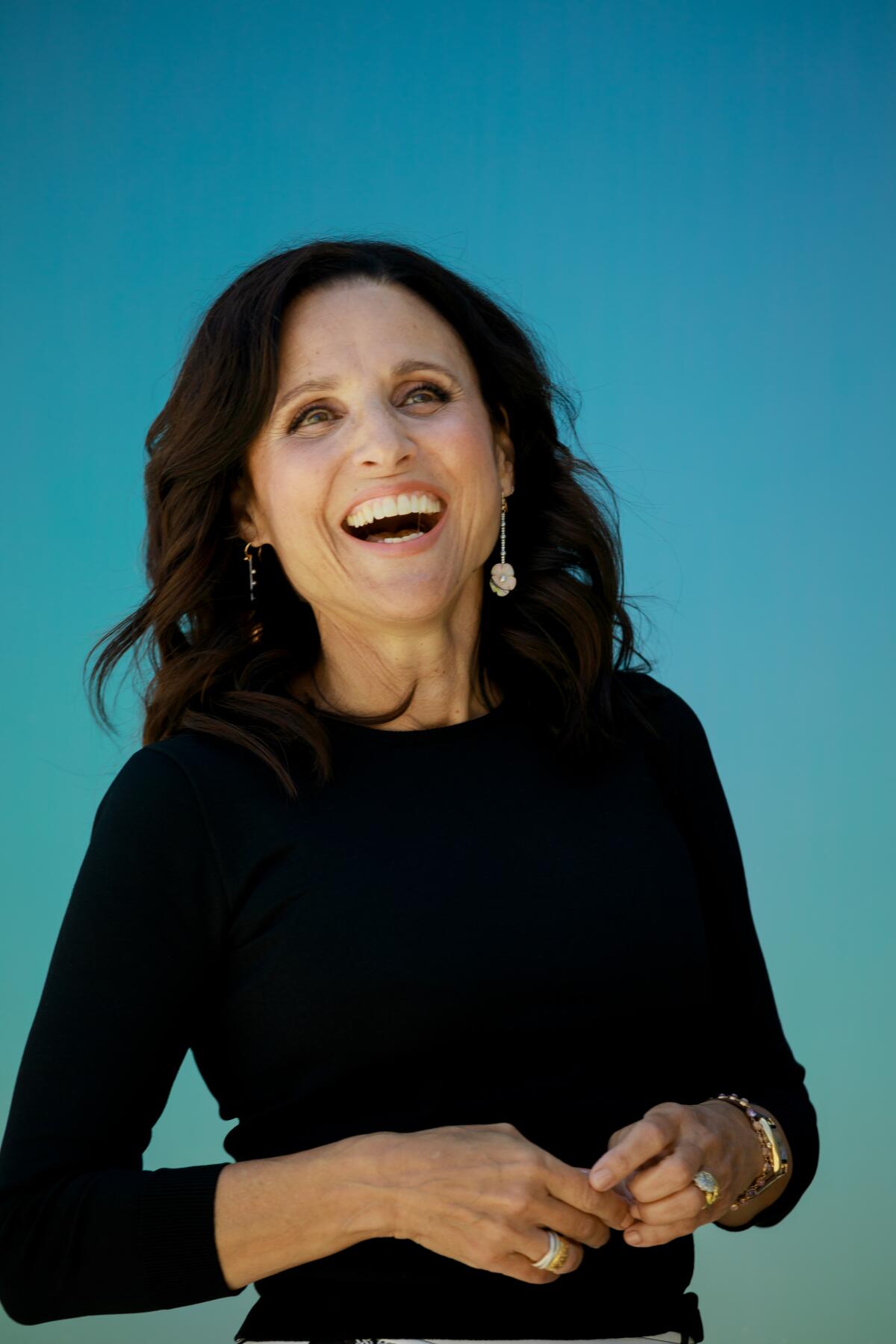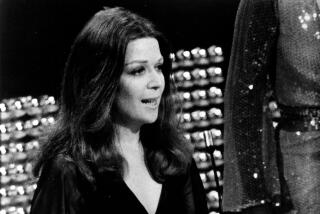For Julia Louis-Dreyfus, returning to ‘Veep’ after cancer was salvation

Two years ago, Julia Louis-Dreyfus attended the Emmys, winning honors as a producer and star of “Veep.” The next morning her doctor called, telling her she had breast cancer. “I howled with laughter, which turned into hysterical crying. I mean, it’s a blow. And an absurd one at that, given the timing.” “Veep” took a 10-month hiatus while she did six rounds of chemo. Now she’ll return to the Emmys next month for the final season of a show that she calls the best — and hardest — job of her life.
We convened some top TV pundits to predict who will win the Emmys. Can you do better than our experts?
Series finales come with outsized expectations and a special level of scrutiny. You’d been through it with “Seinfeld.” How anxious were you about “Veep’s” farewell?
I was incredibly anxious. From the get-go, I felt very protective of the show because I’ve loved it so profoundly. So I had a ferocious feeling that we had to stick this landing. [“Veep” showrunner] David Mandel and I say we crawled through glass to get it right. It was excruciating. But it might be my favorite episode of the series.
Because you feel like you stuck the landing?
Yes. I feel like we wrapped up all the characters in a satisfying way. And there was a glimmer of hope at the end because the legacy of this rancid human being, Selina Meyer, was diminished. And that’s appropriate. She was miserable in the pilot episode and I’m sure she went to her grave completely miserable too. She lacked sympathy. She lacked empathy. [Pause] Man, what a fun character to play.
Going back, do you think “Seinfeld” stuck its landing?
Not quite. I loved the “Seinfeld” finale. I liked many aspects of it. But I understood why people were a little disappointed by it. There was a lot of pressure on that finale. The eyes on that particular episode were many. So there’s probably no way it wouldn’t be divisive. Everybody had an idea about how it should end.
You recently remembered a time when you came home after a long day of shooting, flipped on the TV and came across the “Seinfeld” episode that featured your “Veep” costar Kevin Dunn …
Yes! I texted him and said, “You’re not going to believe what I’m looking at right now. We both look so young!”
Will Julia Louis-Dreyfus win a last Emmy for “Veep”? Can “Fleabag” pull off upsets? Emmy predictions for comedy series, comedy actor and actress.
How often do you flip on the TV and come across “Seinfeld”?
It’s not a regular occurrence. I’m usually watching MSNBC if I’m watching anything at all.
The show has been running constantly in syndication for decades. Why do people keep watching it repeatedly?
I don’t know. It’s had a life. It’s funny? Funny works. It’s nice to get a laugh before you close your eyes, I guess. It’s kind of a release maybe.
Have you had shows you’ve watched for comfort?
“I Love Lucy.” That’s like a good wine. It gets better and better. When I was little, it was “Flipper.” Who can resist Flipper? A talking dolphin! And I watched “All in the Family” again recently. Carroll O’Connor is a stone-cold genius. He plays such a heinous individual. And you adore him.
You walked that tonal tightrope all the time on “Veep.” And you’re remaking “Force Majeure” [now titled “Downhill,” with Louis-Dreyfus and Will Ferrell playing a married couple reexamining their relationship in the wake of an avalanche], a movie replete with flawed characters …
Likability is overrated. I loved the dynamic between the husband and wife in “Force Majeure.” And it showed that how you view your life can shift completely in a heartbeat. Exploring that sudden lens shift in understanding your reality appealed to me.
You and your husband, Brad Hall, lived that lens shift with your diagnosis, which Brad said maybe ended up being a kind of lucky thing, allowing you to take stock. Do you feel that way?
If you’re trying to look at the positive, I feel that way. I’d rather not have gone through it. But I became keenly aware of how precious this life is — my life, life in general. I’ve walked through that.
If someone had said to me, “You’re going to have chemotherapy,” I’d be like, “What?” It’s every cliché you’ve ever heard. “Wait. That doesn’t happen to me. It happens to other people.” And then it happens to you. And you get through it, if you’re lucky. In my case, I did. I’ve known people who haven’t, so I’m really happy I did. Really happy.
Does that keen awareness of the dearness of life last?
No. It comes and goes. But once you’ve walked through a life-threatening illness, there’s this little nagging thing with you all the time. That fear doesn’t completely go away because you’ve been face to face with it.
But you know what? We walk through our lives so oblivious to the fact that our lives are going to end. We really don’t consider that. Ever. Almost ever. Maybe that’s a good thing, to a certain extent. But it’s a cold, hard fact, and it is a strange thing to reconcile.
I’ve probably picked up a dozen books on death and dying over the years and have read maybe one.
I read “Being Mortal” and that really helped me dealing with my father as he was nearing the end of his life. I’d recommend it. It’s a helpful guide on how to talk about death, how to approach it.
Did reading that help you after you were diagnosed?
That book is for dealing with a dying person. And I was not going there in my mind with my illness.
You and Brad have been married 32 years. That’s an accomplishment, but also …
… also a reminder of mortality. It’s so strange. Like when you hit that number of anniversary, it feels like something old people would say. [Pause] But I guess I’m old. I sure don’t think of myself as that. I’m 58. But I feel like I’m about 38.
I watched your Mark Twain Prize acceptance speech from a few months ago and saw your mom. She’s gorgeous. And she looked so proud. In your speech, you acknowledged her, saying she brought “80 of her closest friends.”
Boy, it’s the truth, man. It was a huge negotiation with the Kennedy Center, that long list of friends. But she and my dad, my stepdad, are both very social and involved in their community. So everybody had to come.
You also reprised Elaine’s dance moves, which was funny since I guess Larry David didn’t like that episode. Jennifer Crittenden said she had to wait until he left “Seinfeld” to get that one through. Even then, she worried those dance moves might kill your career.
I did not know that. I came up with that dance, you know. That was my invention. They wrote “weird dance” …
Because they had seen you dance before?
No! I don’t dance like that! That was based on somebody else.
You want to make that clear.
I do want to make that absolutely clear. I’m a good dancer.
If you’re recognized in public, what do people ask? Bill Hader told me it’s all about Stefon and people wanting to talk about Henry Winkler and asking him not to kill NoHo Hank on “Barry.”
I get “Have you thought about running for president?” No. Emphatic no. “No soup for you!” And of course, they’d like to see me dance, which I won’t do either. Or they want me to shove them like on “Seinfeld.” “Get out!” I’m very polite …
But you don’t want to hurt anyone with that Elaine shove.
Exactly. That’s a good alibi. Can I use that?
Was it hard saying goodbye to “Veep”?
It was crushing. It was the correct thing to do, but it was a heartbreaker through and through. It’s the hardest job I’ve ever had and the best job I’ve ever had. The getting down in the dirt, getting it done … it’s just incredibly life-affirming.
Going back to that after treating your cancer must have felt like a kind of salvation.
It was. Oh my God. There was nothing better. To work together as a team to create something and try to be as funny and as authentic and as unusual as possible … that just restored my spirit. It was the absolute best.
More to Read
From the Oscars to the Emmys.
Get the Envelope newsletter for exclusive awards season coverage, behind-the-scenes stories from the Envelope podcast and columnist Glenn Whipp’s must-read analysis.
You may occasionally receive promotional content from the Los Angeles Times.











